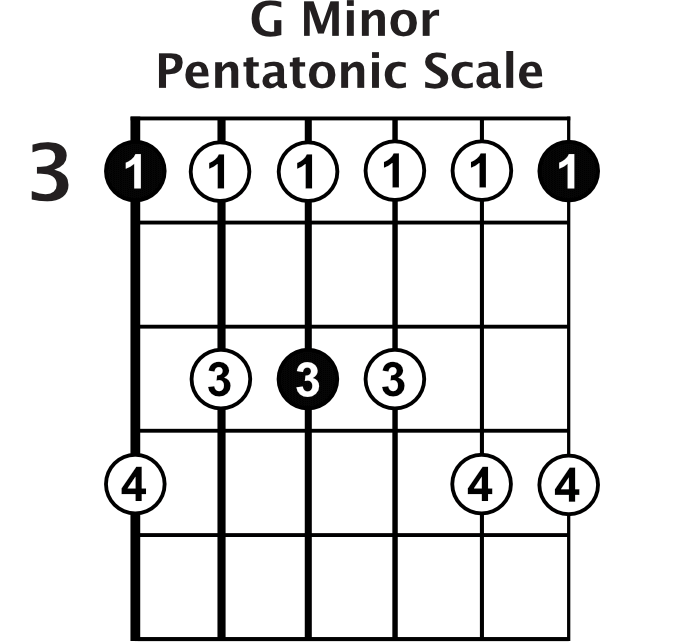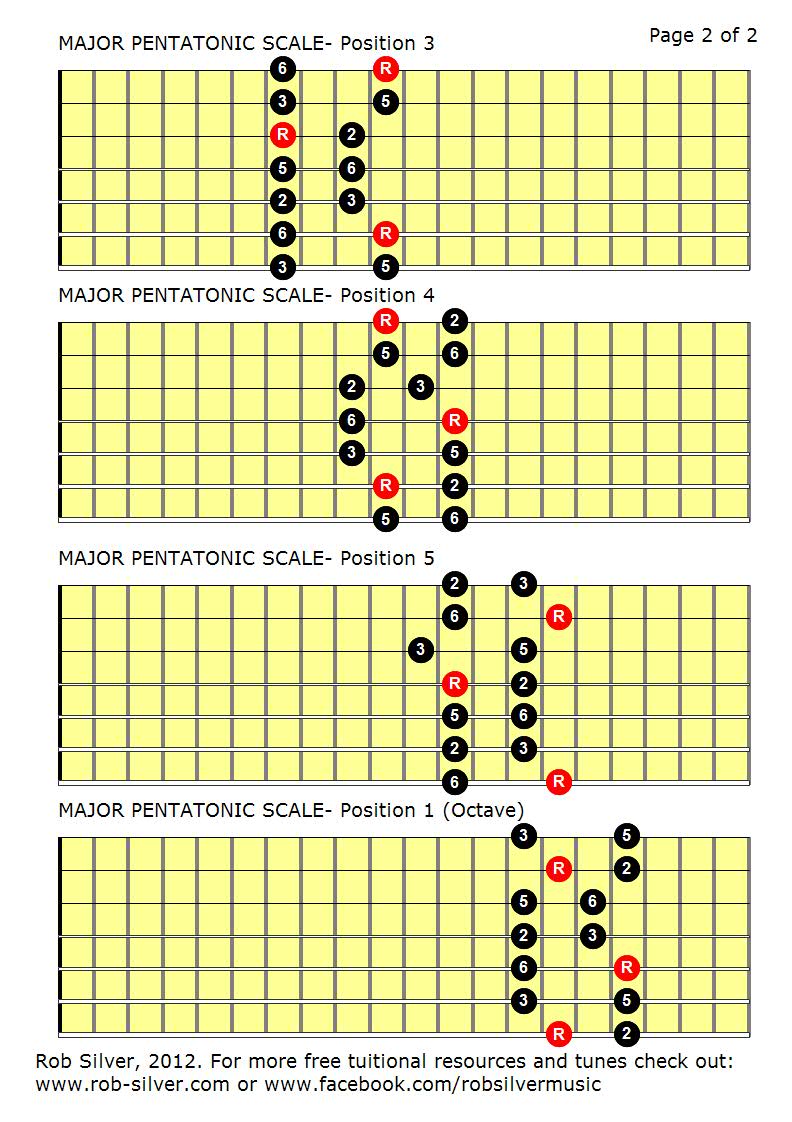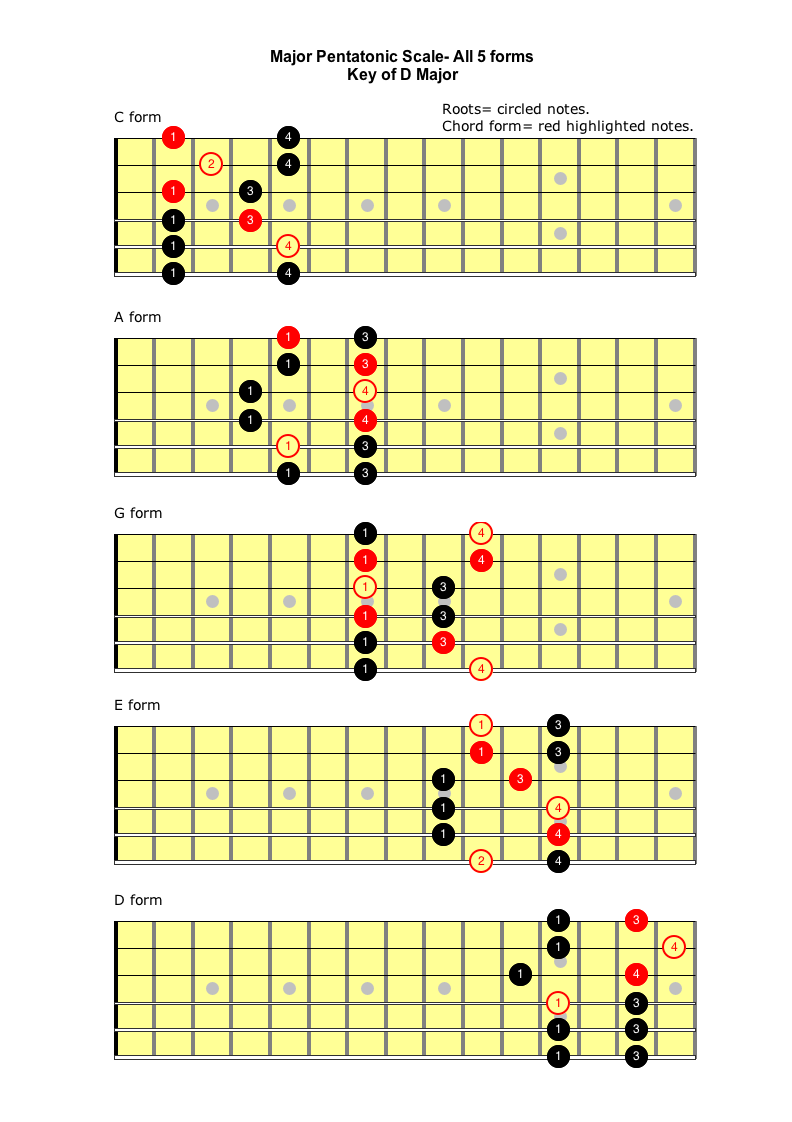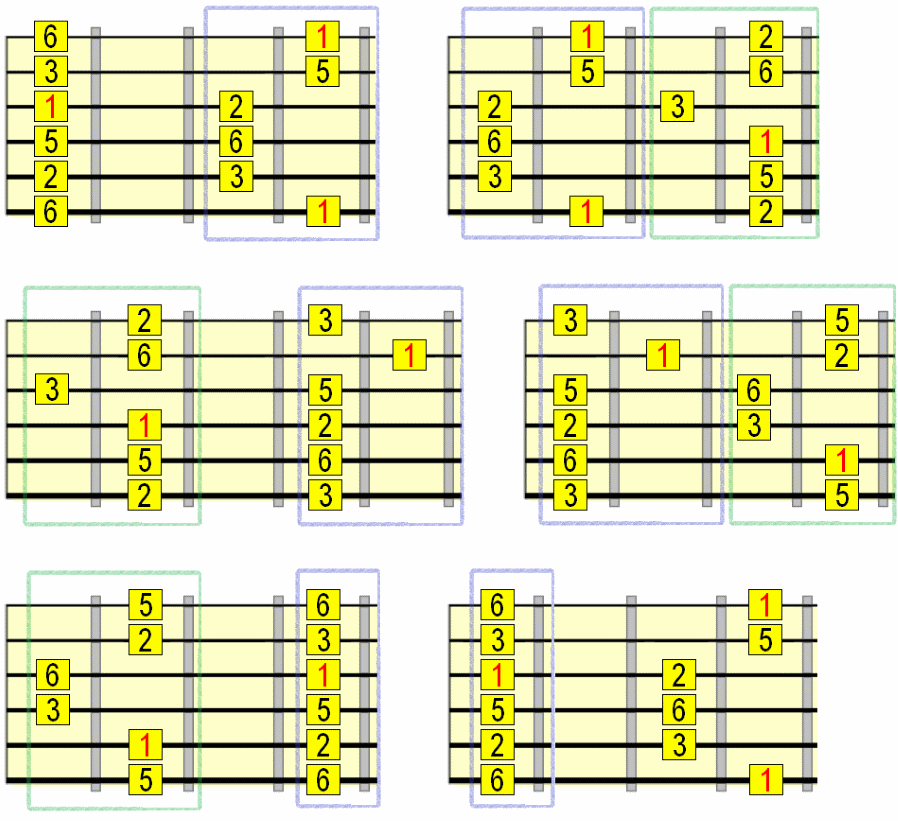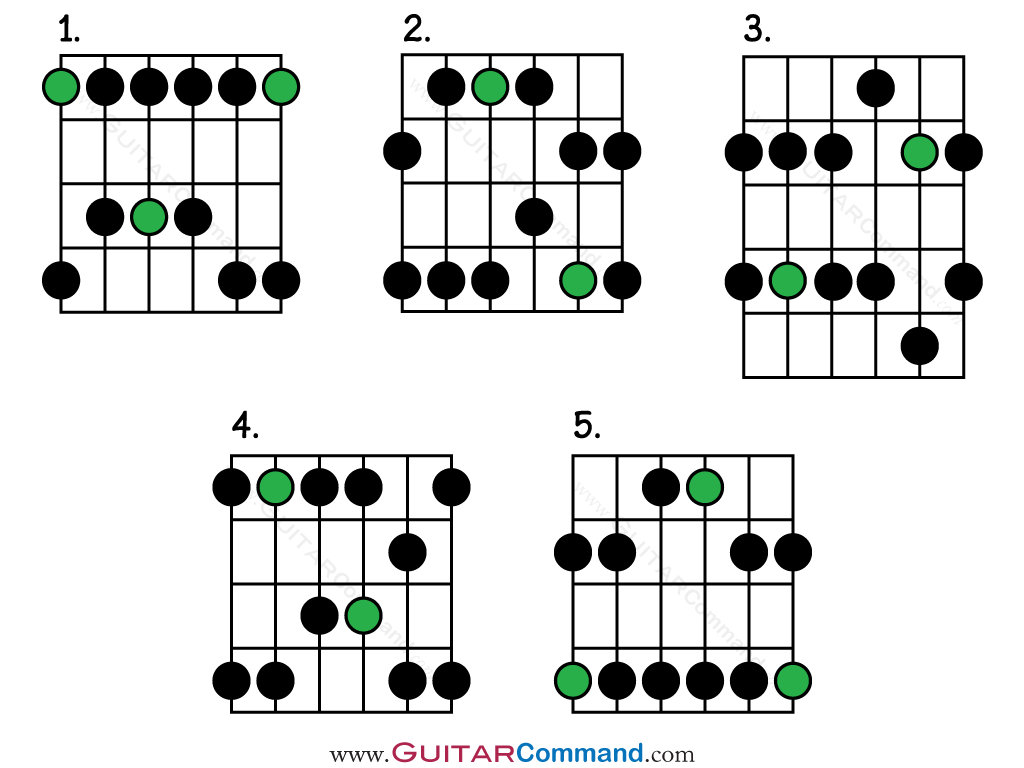Major Pentatonic Scale Patterns
Major Pentatonic Scale Patterns - Web the a major pentatonic scale contains three natural notes and two sharps. Web all 5 patterns of the major pentatonic scale when you’re ready you can try learning all 5 patterns of the scale, which taken together allow you to use the major pentatonic sound all over the fretboard. It's also one of the simplest scales to play as there are only five tones to negotiate, making the patterns very easy to memorise. Web the major pentatonic scale has an intervallic pattern of a m2, m2, m3, m2, and a final m3 (“m” represents major and “m” represents minor), which leads to the octave of the root. The minor pentatonic scale has two notes less than the minor diatonic scale. Tab / notation is also provided. The major & minor pentatonic scales. Web the major pentatonic is a really cool sounding scale, used a lot in country and country blues, and also great for playing over regular chord progressions that would usually take the major scale. Web the ability to visualize and apply scale shapes and patterns across the fretboard is crucial for maximizing the creative potential of the major pentatonic scale. This article features clear diagrams and a back up track for you to solo over. The diagram 1 has tonic note on the sixth and fourth string. Web dive into the a major pentatonic scale with guitar charts. Barre chord types / shapes. Web on this page you’ll find a complete guide to playing the major pentatonic scale on guitar. Web the major pentatonic scale has an intervallic pattern of a m2, m2, m3, m2, and a final m3 (“m” represents major and “m” represents minor), which leads to the octave of the root. The shape 2 have the tonic on the fifth and third string. The diagrams below outline the 5 caged positions for the a major pentatonic scale. Web there are many different ways of playing an a major pentatonic scale on guitar; Web the 5 patterns of the major pentatonic scale a major pentatonic pattern 5 (g shape) a major pentatonic pattern 1 (e shape). The minor pentatonic scale has two notes less than the minor diatonic scale. The diagram 1 has tonic note on the sixth and fourth string. The major pentatonic is a really cool sounding scale, used a lot in country and country blues, and also great for playing over regular chord progressions that would usual. Web similar to the major scale in the caged system, the pentatonic scale contains five patterns that are each. Let’s learn about them below! There are 5 shapes for the pentatonic scale and each shape contains both major and minor pentatonic scales. Web diagrams & notation » scales » major pentatonic scale: Web on this page you’ll find a complete guide to playing the major pentatonic scale on guitar. Explore our interactive fretboard diagrams and listen to audio examples. We start with a basic major pentatonic scale guitar pattern, then introduce additional fretboard patterns that will allow you to play major pentatonic scales all over the guitar neck. The diagram 1 has tonic note on the sixth and fourth string. A major pentatonic pattern 3 (c shape) a major pentatonic pattern 2 (d shape) a major pentatonic pattern 4. Web the ability to visualize and apply scale shapes and patterns across the fretboard is crucial for maximizing the creative potential of the major pentatonic scale. The diagram 1 has tonic note on the sixth and fourth string. Web there are two main types of pentatonic scale guitar shapes that we will look at as beginners: Web once you’ve become. It encourages fluid movement and improvisation, enabling musicians (like yourself) to explore new textures and sonic landscapes. Minor 7th chords (15b7b3 voicing) jazz chord shortcuts. In the scale diagrams below, i outline each of the scale positions, the root note patterns of the position, and the suggested fingering of the notes for the position. It's also one of the simplest. Web once you’ve become familiar with the pentatonic scale along each string it’s time to start learning the different shapes for them on the guitar fretboard. Tab / notation is also provided. Web the major pentatonic scale is probably the most commonly used major key scale, not only in guitar solos, but also other instrumental and vocal melodies. Ideal for. Web the ability to visualize and apply scale shapes and patterns across the fretboard is crucial for maximizing the creative potential of the major pentatonic scale. Web once you’ve become familiar with the pentatonic scale along each string it’s time to start learning the different shapes for them on the guitar fretboard. Web learn the 5 major pentatonic scale patterns. Web similar to the major scale in the caged system, the pentatonic scale contains five patterns that are each connected to the pattern above and below it on the fretboard. Tab / notation is also provided. Each of these shapes is derived from a larger scale: Barre chord types / shapes. Links mentioned in this video and related lessons: In the scale diagrams below, i outline each of the scale positions, the root note patterns of the position, and the suggested fingering of the notes for the position. Web the major pentatonic scale has an intervallic pattern of a m2, m2, m3, m2, and a final m3 (“m” represents major and “m” represents minor), which leads to the octave. Web there are two main types of pentatonic scale guitar shapes that we will look at as beginners: The major & minor pentatonic scales. This article features clear diagrams and a back up track for you to solo over. Web the major pentatonic is a really cool sounding scale, used a lot in country and country blues, and also great. Web the major pentatonic scale is probably the most commonly used major key scale, not only in guitar solos, but also other instrumental and vocal melodies. Barre chord types / shapes. In the scale diagrams below, i outline each of the scale positions, the root note patterns of the position, and the suggested fingering of the notes for the position. It's also one of the simplest scales to play as there are only five tones to negotiate, making the patterns very easy to memorise. Web once you’ve become familiar with the pentatonic scale along each string it’s time to start learning the different shapes for them on the guitar fretboard. Web the major pentatonic scale has an intervallic pattern of a m2, m2, m3, m2, and a final m3 (“m” represents major and “m” represents minor), which leads to the octave of the root. The diagrams below outline the 5 caged positions for the a major pentatonic scale. Each of these shapes is derived from a larger scale: Explore our interactive fretboard diagrams and listen to audio examples for each pattern. Web the ability to visualize and apply scale shapes and patterns across the fretboard is crucial for maximizing the creative potential of the major pentatonic scale. The minor pentatonic scale has two notes less than the minor diatonic scale. Web diagrams & notation » scales » major pentatonic scale: Web learn the 5 major pentatonic scale patterns to use in your guitar solos. Ideal for guitarists seeking to understand and play the a major pentatonic scale effortlessly. Web from the basic pentatonic scale guitar fretboard pattern to improvising using minor pentatonic scales all over the guitar neck; The shape 2 have the tonic on the fifth and third string.CAGED MAJOR Pentatonic / Arpeggio / Scale A fingering diagram made
Printable Pentatonic Scale Guitar
A Guide To The Pentatonic Scale On Guitar Guitareo Riff
ROB SILVER THE MAJOR PENTATONIC SCALE MAPPED OUT FOR SEVEN STRING GUITAR
Major Pentatonic Scale Self Taught Guitar Lessons
The Major Pentatonic Scale » Lead Guitar Lessons
5 Pentatonic Scale Patterns You Must Know Constantine Guitars
The Fun Way to Learn Major Pentatonic Patterns
Major pentatonic scale Ricmedia Guitar
Pentatonic Scale Guitar The Ultimate Guide All Patterns, TAB & Notation
The Major & Minor Pentatonic Scales.
Links Mentioned In This Video And Related Lessons:
Web The Major Pentatonic Is A Really Cool Sounding Scale, Used A Lot In Country And Country Blues, And Also Great For Playing Over Regular Chord Progressions That Would Usually Take The Major Scale.
That’s What The Major Pentatonic Scale Is For.
Related Post:


